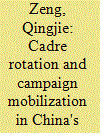| Srl | Item |
| 1 |
ID:
132949


|
|
|
|
|
| Publication |
2014.
|
| Summary/Abstract |
China's national leaders see restructuring and diversification away from resource-based, energy intensive industries as central goals in the coming years. On the basis of extensive fieldwork in China between 2010 and 2012, we suggest that the high turnover of leading cadres at the local level may hinder state-led greening growth initiatives. Frequent cadre turnover is intended primarily to keep local Party secretaries and mayors on the move in order to promote the implementation of central directives. While rotation does seem to aid implementation by reducing coordination problems, there are also significant downsides to local leaders changing office every three to four years. Officials with short time horizons are likely to choose the path of least resistance in selecting quick, low-quality approaches to the implementation of environmental policies. We conclude that the perverse effects of local officials' short time horizons give reason to doubt the more optimistic claims about the advantages of China's model of environmental authoritarianism.
|
|
|
|
|
|
|
|
|
|
|
|
|
|
|
|
| 2 |
ID:
153318


|
|
|
|
|
| Summary/Abstract |
In authoritarian regimes, anticorruption measures are fundamentally mechanisms of controlling agents at various levels. To do this, the principal can either rely on routine bureaucratic management or resort to ad hoc, intense mobilization to discipline its agents. Using China as a case study, this article explores which mode of top-down control exerts greater influence on the pattern of anticorruption enforcement. We focus on the cadre rotation system as an example of routine management techniques and examine its effects on provincial level enforcement. We also investigate how provinces respond to the central government's periodic call to intensify anticorruption efforts. Based on provincial enforcement data from 1998 to 2013, our analysis finds that the proportion of rotated officials has little impact on enforcement outcomes. Rather, the vigor of enforcement in the provinces responds strongly to national policy priorities, suggesting a highly centralized disciplinary system. Moreover, provinces of greater political importance are under more central pressure to conform. The findings challenge the often-made argument that stable institutions are effective in fostering top-down control in authoritarian regimes, and suggest that campaign mobilization continues to be an essential instrument at the dictator's disposal.
|
|
|
|
|
|
|
|
|
|
|
|
|
|
|
|
| 3 |
ID:
189505


|
|
|
|
|
| Summary/Abstract |
Traditional analysis of China's policy experimentation has focused on the role of central–local relations and rotating leaders in shaping the local agenda-setting process. Less is known about the role of less mobile mid-level local bureaucrats who serve as bridges in the implementation process. This paper examines why some cities have performed better than others at implementing and maintaining low-carbon policy experiments. Drawing on a comparison of four case cities and over 100 expert interviews, I argue that the availability of bureaucratic entrepreneurs and their resource mobilization capacity determine the level of local engagement in climate policy experimentation. This study shows that the institutionalization of local policy experiments is not only driven by the central government or rotating top local leaders but also by bureaucratic entrepreneurs who help policy experiments survive periodic changes in the bureaucracy. The findings have important implications for the fulfilment of China's 2060 carbon neutrality pledge.
|
|
|
|
|
|
|
|
|
|
|
|
|
|
|
|